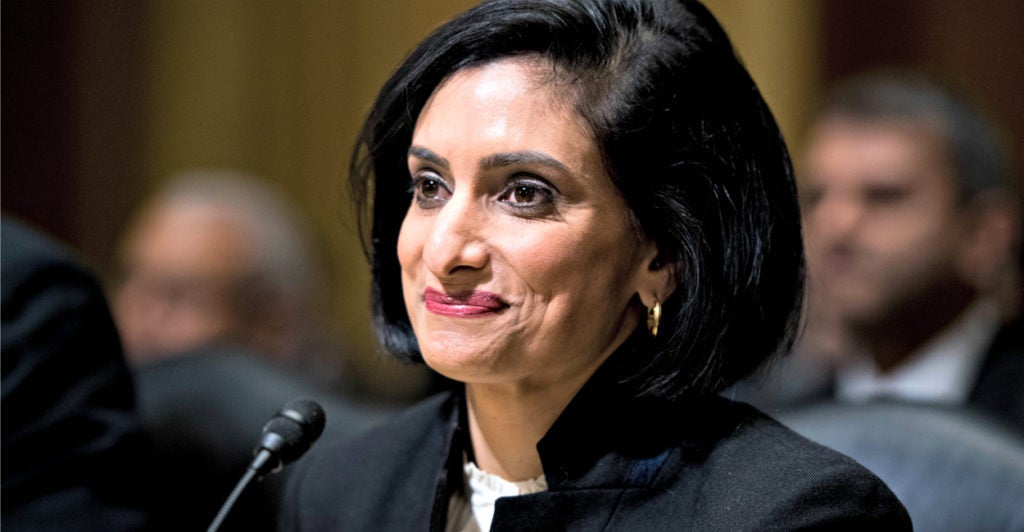The Senate Finance Committee has completed nearly four hours of confirmation hearings for Seema Verma, President Donald Trump’s nominee for administrator of the Centers for Medicare and Medicaid Services.
A Senate hearing is always a challenge for a new administration, but the Hill got it right: Verma, the daughter of immigrants from India, “cruised” through the ordeal, leaving frustrated liberal Democrats in her wake.
The Centers for Medicare and Medicaid Services is the division of the Department of Health and Human Services responsible for administering Medicare, Medicaid, the Children’s Health Insurance Program, and the health insurance marketplace (the Obamacare federal exchanges).
CMS programs cover 100 million people, roughly one-third of America’s population. Verma’s mission as head of the CMS team will be to focus on improving health outcomes, access, and affordability while reducing disparities in health care and combating health care fraud.
In her appearance before the Finance Committee, Verma didn’t provide any details about what specific policy changes she thought necessary to preserve Medicare for the next generation of retirees. She indicated, however, her willingness to work with Congress.
In response to senators’ questions, Verma acknowledged that Medicare faces big troubles.
There is little doubt about the size and scope of the program’s problems. Consider key findings from the 2016 Medicare Trustees Report:
- The hospital insurance trust fund is dwindling faster than anticipated.
- Medicare spending once again is accelerating.
- Taxpayers face heavier burdens.
- Because of Obamacare’s Medicare payment reductions, seniors face difficulty in getting access to care.
Another, but unsurprising, development at the hearing was the standard display of liberal perspectives on Medicare reform. Liberal Senate Democrats have been trying to characterize recent reform proposals to expand defined contribution financing as tantamount to turning the program into a “voucher system.”
This is a false characterization. In fact, no one in Congress is proposing to give seniors vouchers or certificates to use in purchasing health insurance on some unregulated private market.
Sen. Bill Nelson, D-Fla., nonetheless posed that question.
Verma responded: “I’m not supportive of that. … But I think it’s important that we look for ways of making sure that the program is sustainable.”
Of course Verma doesn’t support that approach. In fact, it’s hard to find anyone in Congress who is in favor of giving seniors “vouchers.” Virtually all reformers, on and off Capitol Hill, want to expand the defined contribution financing that now characterizes Medicare Part D and, with some modifications, Medicare Advantage.
Both are large, popular programs with high rates of patient satisfaction. More than three out of four seniors already are enrolled in Medicare Part D, and almost one-third are enrolled in Medicare Advantage. Both are conventional, defined contribution programs, where the government makes a per capita payment to a health plan of a senior’s choice.
The Heritage Foundation and a bipartisan proposal from Sen. Ron Wyden, D-Ore., and House Speaker Paul Ryan, R-Wis., both adopt this approach, which is the best way to keep patients at the center of their health care decision-making. Nonetheless, this tiresome “Mediscare” tactic, an old standby of leftist fearmongering, has been going on for years.
As for Medicare Part D, senators asked Verma whether she thought Medicare should “negotiate” drug prices directly with drug manufacturers, as is done today in the Veterans Administration program. There isn’t “a simple yes or no answer,” she responded.
In fact, private sector negotiations between competing health plans and drug companies have stabilized Part D premiums since the inception of the program. The aggregate costs of the program have fallen to approximately 50 percent lower than the original Congressional Budget Office projections.
Competition is key to holding down the cost of pharmaceuticals, Verma reiterated, adding: “We need to do everything we can do to make drugs more affordable for seniors.”
Verma also signaled her awareness of the many frustrations faced by physicians and other medical professionals who currently wrestle with Medicare’s enormous regulatory regime—in particular the payment system mandated by the Medicare Access and CHIP Reauthorization Act of 2015.
Physicians are right to expect some sort of regulatory relief, particularly under the leadership of HHS Secretary Tom Price, the physician and former congressman who will be Verma’s boss.
Verma, who pioneered Medicaid reform in Indiana, was particularly pointed in her critique of the Medicaid program, saying she found the status quo unacceptable. Measures to improve the program, she indicated, should treat able-bodied recipients differently than the disabled population, including those who depend upon nursing or custodial care.
Verma called for greater flexibility for the states in administering Medicaid, suggesting her support for putting the states in a leadership role in implementing reforms.
The next CMS administrator will face many financial, structural, and demographic challenges with the health care programs the agency oversees that affect millions of Americans on a daily basis. It is imperative that reforms focus on putting patients at the center of their health care decision-making and limit the government’s interference.
